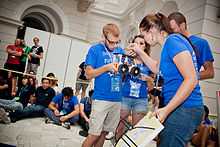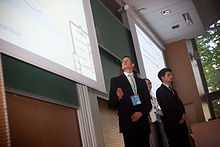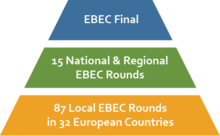European BEST Engineering Competition
|
Logo of EBEC | |
| Motto | Design the future. Today |
|---|---|
| Established | 2009 |
| Type | Engineering Competition |
Region | Europe |
| Website | http://ebec.BEST.eu.org |
European BEST Engineering Competition (EBEC) is the largest real-time based engineering competition conducted by Board of European Students of Technology (BEST), gathering best European students of engineering. With EBEC Project BEST aims to develop participants skills thus not only theoretical knowledge also their practical knowledge which will help them to tackle problems which humanity faces each day. Project brings together students, universities, companies and NGOs (Non-governmental organizations).
Concept
Students are offered to participate in these two categories:
Team design: is a category which competitors can use their practical skills to design. Competitors need to build a functional device regarding to a technical problem given in a limited amount of time and resources. ;

Case study: is the category about analytic and economic skills. CS category is more conceptual competition which consists of solving a theoretical, technical or a managerial problem occurring in real life or industry. Participants develop hypothetical solutions with no actual construction of any device or assembling of some materials, but using the given information.;

Mainly, only the first two categories are offered on BECs (BEST Engineering Competitions) and there are only these two categories presented on EBEC final. The project welcomes teams in group of four, who are currently enrolled in an educational programme where an EBEC round is present.
EBEC Pyramid
EBEC pyramid represents the three levels of Competitions: First level - Local BEST Engineering Competition (LBEC) - is held within one University and organised by one Local BEST Group (LBG). Winners of this level go to the next stage.
Second level - Regional/National BEST Engineering Competition (RBEC/NBEC) - is held within one region/country and organised by one of the LBGs from that region/country. This level has 15 Regional/National BEST Engineering Competition (RBEC/NBEC). Winning teams go to the next, last level of Competitions.
Third level - European BEST Engineering Competition Final event (EBEC Final) - involves students from more than 87 leading universities represented in BEST and the winners are awarded the honorary title of best European engineers.

List of all national/regional round:
- EBEC Alpe-Adria
- EBEC Balkan
- EBEC Baltic
- EBEC Benelux
- EBEC Central
- EBEC France
- EBEC Greece
- EBEC Italy
- EBEC Nordic
- EBEC Poland
- EBEC Portugal
- EBEC Romania & Republic of Moldova
- EBEC Spain
- EBEC Turkey
- EBEC Ukraine
History of EBEC
The idea of Engineering Competitions was brought into Europe in 2002.
The first real experience with an Engineering Competition (EC), came in March 2002 when some members of BEST went to the Canadian Engineering Competition (CEC) organised by the Canadian Federation of Engineering Students (CFES). They came back very enthusiastic and started to promote the idea for this kind of BEST event.
LBG Eindhoven and LBG Ghent were highly motivated to organise this first B(E)EC (BEST European Engineering Competitions) together with CWG (Competitions Work Group), and so it took place on the 17–23 October 2003. The first B(E)EC took place in Belgium with 60 participants from all over Europe. Half of them participated in teams of 4 people in a 2-day Team Design, the other half in a 2-day Case Study, followed by a presentation day. In the evenings 32 participants debated in teams of 2 people.
The second B(E)EC was organised by LBG Warsaw and CWG between 8th and 16 October 2004 in Poland. 80 participants participated in either Team Design, Case Study or Negotiation and could also take part in the debates in the evening.
In 2005 following BECs were organised: BEC Sofia (March 2005) BEC USTU (May 2005) BEC Zagreb (September 2005) All in all, the Engineering Competition project has grown up a lot in only few years.
EBEC 2009 was organised between 1st - 12 August 2009 in Ghent. This edition of EBEC had 80 participants involved in two categories: Team Design and Case Study. Participants were winners from NEC/REC in category CS and TD. Every team who won NEC / REC in TD or CS category competed in EBEC. One team consisted of 4 students.
EBEC 2010 took place in the period of 1st - 11 August 2010 in Cluj-Napoca. This edition of EBEC had 104 participants participated in two category Team Design and Case Study. Participants were winners of 13 NEC/REC in category CS and TD.
EBEC 2011 was organised between 1st - 10 August 2011 in Istanbul. The competition gathered 104 top technical students in Istanbul united by one passion – engineering. This was the 3rd edition of EBEC, considered the biggest engineering competition organised by a students’ organisation in Europe.
EBEC 2012 was organized between 1 – 8 August 2012 and gathered 104 top European technical students competing at European BEST Engineering Competition (EBEC) final in Zagreb, Croatia, in two categories: Team Design and Case Study.
EBEC 2013 took place between 1 – 9 August 2013 in Warsaw, Poland. Warsaw hosted top European technical students competing at European BEST Engineering Competition (EBEC) final in in two categories: Team Design and Case Study.
EBEC 2014 was organised in Riga, Latvia between 1–9 August 2014. 30 most creative and innovative teams of 4 students who pass through one of, 87 local rounds and 15 national/regional rounds had the chance to prove themselves in EBEC Final.
EBEC 2015 will be held in Porto, at the premises of University of Porto.
Partners
This event was supported by UNEP (United Nations Environmental Programme), which provided a real-life problem for the team design part. During recent years EBEC was recognised as partner of many companies and institutions. Some of them are: European Year of Creativity and Innovation, Detur, KasperskyLab, Siemens, Infineon, TÜBİTAK, Istanbul Chamber of Commerce (ICOC), and for this year the partners are INA (National Oil Company in Croatia).
Other universities that supported EBEC during recent years were: Kungliga Tekniska Högskolan (KTH), Technische Universität Wien, Univerza v Ljubljani, Universidad de Valladolid, Universidade de Aveiro, Zaporiz'kiy Natsionalniy Techninichnyi Universytet, Polytechnio Kritis, Technical University of Madrid, Istanbul Teknik Universitesi, Technische Universität Graz, Yildiz Teknik Universitesi, Lviv University of Technology, University of Patras.
Supporters of EBEC are: Young in Action, European Society for Engineering Education (SEFI), Institute of Electrical and Electronics Engineers and UNESCO.
EBEC Final 2014 has been supported with attention from several authorities such as Riga Technical University, UNESCO, The International Federation of Engineering Education Societies (IFEES), Deutsche Bahn, FIMA, European Patent Office, MathWorks, Škoda Auto
Gallery
-

European BEST Engineering Competitions|Caption1
-

European BEST Engineering Competitions|Caption2
-

European BEST Engineering Competitions|Caption3
-

European BEST Engineering Competitions|Caption4
-

European BEST Engineering Competitions|Caption5
-

European BEST Engineering Competitions|Caption6
-

European BEST Engineering Competitions|Caption7
-

European BEST Engineering Competitions|Caption8
-

European BEST Engineering Competitions|Caption9
-

European BEST Engineering Competitions|Caption10
-

European BEST Engineering Competitions|Caption11
-

European BEST Engineering Competitions|Caption12
-

European BEST Engineering Competitions|Caption13
-

European BEST Engineering Competitions|Caption14
-

European BEST Engineering Competitions|Caption15
-

European BEST Engineering Competitions|Caption16
-

European BEST Engineering Competitions|Caption17
References
- http://bestistanbul.org/ebec2011/
- http://ebec.best.eu.org
- http://www.best.eu.org/index.jsp
- http://en.wikipedia.org/wiki/Board_of_European_Students_of_Technology
- http://studentcompetitions.com/competitions/european-best-engineering-competition
